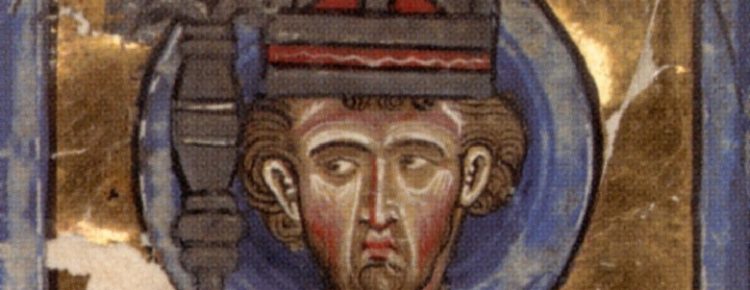St. Oswald
Oswald, son of the Northumbrian King Ethelfrith, fled to Scotland in 616 when Edwin seized his father’s kingdom. Oswald travelled to Iona and became a Christian there.
When Edwin died in 633, Oswald and his family returned to Northumbria. Determined to regain his kingdom, Oswald assembled an army at Heavenfield near Hexham, where he erected a wooden cross, gathered his army around it, and prayed for victory. Despite being heavily outnumbered Oswald won the day and regained his kingdom.
Having secured his KIngdom, Oswald’s next task was to convert his subjects to Christianity. He sent for a Bishop from Iona , who turned out to be very severe and had no success. He was replaced by Bishop Aidan. Oswald had to translate his sermons as Aidan only spoke Irish, but Aidan had great success and was given the island of Lindisfarne and an episcopal seat near Bamburgh.
Unfortunately, Oswald did not reign for long. After only eight years, he was killed in battle at Maserfield by the pagan King Penda of Mercia ; he was only 38 years old. Oswald’s body was dismembered and his head was buried at Lindisfarne . Under the threat of invasion in 875, the monks removed Oswald’s head and Cuthbert’s body. They were carried by the monks to many locations and eventually buried together at Durham . Soon after his death, Oswald was made a saint and his fame spread throughout Europe. In the 19th century, Cuthbert’s coffin was opened and was found still to contain Oswald’s head.
There are sixty-two churches are dedicated to Oswald in England and some in Europe. Oswald travelled through this district on his way to Maserfield. It is likely that he followed the ancient salt road which went over the moors and came out approximately where the Grey Mare Pub is near Belthorne. Church Kirk was originally dedicated to Oswald, and there was a Holy Well in the Churchyard there – I’ve had a look but can find no trace of it.
I love the story of Oswald following St. Aidan around Northumbria, translating for him as Aidan brought the Christian message to the people. Here was a King who didn;t mind getting his hands dirty, a King who was also a servant for the sake of the gospel. Let us learn from him the art of humility, and also remember how much Oswald was prepared to give when it came to ‘translating’ the Gospel into the language of the people.
Increasingly we live in a society where people don’t know the Christian story – we have almost travelled full circle back to those early days in the great KIngdom of Northumbria, where people were hearing the Christian message for the first time. Maybe the church has spent too much time in the higher echelons of society? We know how to put on a good show for a coronation, a royal funeral or the enthronement of a bishop. But have we forgotten how to get off our horses and walk amongst ordinary folk, poor folk, bringing the good news of the gospel. We’re past the days when people will come to us – we have to go to them, just as Oswald did with his friend Aidan.
There’s a legend that, one Easter, when Aidan and Oswald were dining together, a servant entered to say that there were many poor outside the gate seeking alms. Oswald took up a great silver dish and filled it with all sorts of foods from the royal table, and gave it to the steward. He told him to give out the food and then break the silver plate into pieces to hand out to the crowd as well.
This is a true gospel story, for the gospel is the story of God’s unending and unstinting generosity and love. It’s easy, when times are hard, in both our personal lives and in our life as a church, to forget about abundance and generosity and to become small and mean. We must guard against this. The gospel tells us we will reap what we sow. Part of our faith is to continue to give out generously with whatever we have, again both individually and together. This is required of us in terms of time, money and our gifts – like Oswald, we are called to give whatever we have in the service of the gospel.
I’ve just finished reading the wonderful Lindchester Trilogy by Catherine Fox – well worth a read. There’s a lovely
moment where a Vicar finds all his mum’s linen and china that she’s been ‘saving for best’ all her life – as a consequence of which they were never used. Together they decide that ‘now’ is ‘best’, ‘a special occasion’ and they start to use the china both themselves but also to when they feed the homeless people who sleep in the churchyard. This is a real gospel moment – an outpouring of generosity which says ‘you’re special’, ‘you’re worth it’ – which is exactly what God says to each of us.
There is a further legend that Oswald planted acorns near Accrington – that’s where the Acc bit of Accrtington’s name comes from. Today, after you have received the bread and wine, you will be offered an acorn to take away. Please keep it in a pocket or somewhere safe and use it to remind you to pray for our church – for its people, its parish and its mission. There will be acorns to spare – we’ll keep these in church so you can take another if you lose one. Let’s use these to pray for our Church of St. Oswald, and let us lead lives worthy of our patron – a King who went along the people, a man of immense generosity and courage.
Amen

